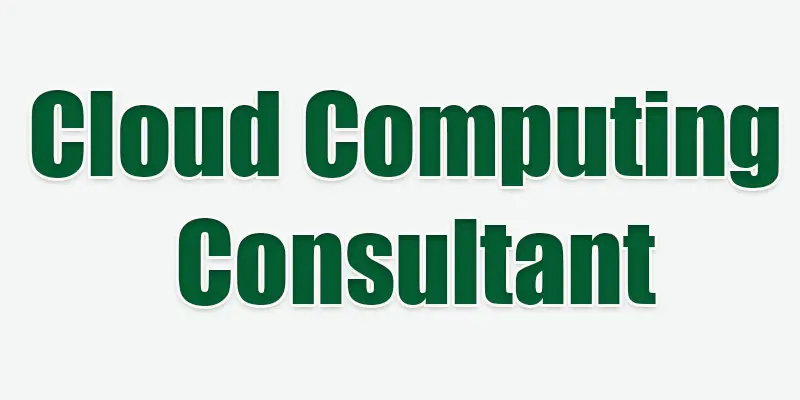Consultant Cloud Computing | What They Do and Why It Matters
Published: 24 Jul 2025
Cloud Computing Consultant for Small Businesses
A Cloud Computing Consultant helps businesses move to the cloud, boost performance, and save money. Over 90% of companies now use some form of cloud service. Feeling lost about which cloud platform to choose or how to keep your data safe? You’re not alone, many businesses struggle with these same questions. That’s where a cloud consultant steps in to make things easier, faster, and safer. Picture this your files, tools, and team all working smoothly from anywhere in the world.
What Does a Cloud Computing Consultant Do?
A Cloud consulting service helps businesses use cloud technology in the easiest, smartest, and most secure way.
- Helps businesses move their work to the cloud.
- Choose the best cloud service (like AWS, Google Cloud, or Azure).
- Sets up cloud storage, servers, and apps.
- Keeps company data safe with cloud security tools.
- Plans and manages cloud-based projects.
- Fixes issues and gives tech support when needed.
- Helps reduce costs by picking the right cloud tools.
- Trains teams on how to use cloud systems.
- Makes sure everything runs fast and smoothly.
- Updates and maintains cloud systems over time.

| Skills and Tools Used by Cloud Consultants |
|---|
|
Cloud consultants use smart skills and tools to set up, manage, and protect cloud systems for businesses. Skills:
Tools:
|
Types of Cloud Consulting Services
There are different types of cloud consulting services that help businesses move to the cloud, stay secure, and get the most out of their technology.
- Cloud Migration
- Cloud Strategy Planning
- Cloud Architecture Design
- Cloud Security and Compliance
- Cloud Cost Optimization
- Hybrid and Multi-Cloud Solutions
- Cloud Performance Monitoring
- Disaster Recovery Planning
- Cloud Application Development
- Ongoing Cloud Support and Maintenance
Cloud Migration
Cloud Migration means moving your data, apps, or systems from old computers to the cloud. It helps make your business faster, safer, and easier to manage.
Cloud Strategy Planning
Cloud Strategy Planning means creating a simple plan for how your business will use cloud services. It helps you choose the right tools, save money, and reach your goals faster.
Cloud Architecture Design
Cloud Architecture Design means setting up the structure of your cloud system. It makes sure everything works smoothly, safely, and fits your business needs.
Cloud Security and Compliance
means keeping your data safe in the cloud and following important rules. It protects your business from hacks, leaks, and legal problems.
Cloud Cost Optimization
Cloud Cost Optimization means finding ways to spend less on cloud services. It helps you use only what you need and avoid extra charges.
Hybrid and Multi-Cloud Solutions
Hybrid, e.g, Multi Cloud Solutions, means using two or more cloud types together. This gives your business more flexibility, control, and better backup options.
Cloud Performance Monitoring
Cloud Performance Monitoring means checking if your cloud systems are working fast and smoothly. It helps find and fix problems before they affect your work.
Disaster Recovery Planning
Disaster Recovery Planning means creating a backup plan to protect your data during problems like system crashes or cyberattacks. It helps your business recover quickly.
Cloud Application Development
Cloud Application Development means building apps that run on the cloud instead of local computers. It makes your apps faster, easier to update, and accessible from anywhere.
Ongoing Cloud Support and Maintenance
Ongoing Cloud Support and Maintenance means getting regular help to keep your cloud systems running well. It includes updates, fixes, and quick support when issues come up.
You should hire a cloud consultant when you’re moving your business to the cloud for the first time. They help you choose the right platform, set it up properly, and avoid costly mistakes. This saves time and keeps things running smoothly from the start.
They’re also helpful when your business is growing fast or facing tech issues. A consultant can improve performance, boost security, and make sure your cloud setup fits your needs.
Real-Life Use Cases of Cloud Computing Consultant in Business
A small online clothing store wanted faster website speed and better security. An Enterprise cloud consultant helped move their site to AWS, set up auto-scaling, and improved loading times. As a result, their sales and customer experience improved.
In another case, a school needed to run virtual classes for students in different cities. A consultant used Microsoft Azure to set up cloud-based classrooms and secure file sharing. This made learning easy and smooth for both teachers and students.
Choosing the right cloud consultant helps your business get the best cloud setup, support, and results without confusion.
- Check their experience: Look for someone who has worked on similar cloud projects.
- Ask for certifications: Like AWS, Azure, or Google Cloud certifications.
- Read client reviews: See what others say about their work.
- Understand their process: Make sure they explain how they work step by step.
- See if they know your industry: A good fit understands your business needs.
- Check communication skills: They should explain things in simple words.
- Compare pricing: Choose someone who offers clear and fair pricing.
- Ask about support: Make sure they offer help after the setup, too.
Costs Involved in Hiring a Consultant
Hiring a cloud consultant comes with different costs based on the work, time, and tools needed for your project.
- Hourly Rate: Some consultants charge per hour based on their experience.
- Project-Based Fee: Fixed cost for a full project, from setup to delivery.
- Monthly Retainer: Ongoing support for a monthly payment.
- Consultation Fee: One-time fee for advice or planning help.
- Extra Charges: Costs may go up for urgent tasks or extra services.
- Training Fees: If they train your team, that might cost extra.
- Tool or Software Costs: You may need to pay for cloud tools separately.
- Cost depends on Project Size: Bigger or more complex jobs cost more.

Conclusion About Cloud Architecture Consultant for Enterprise Solutions
A Cloud infrastructure consultant can truly transform how your business works by making it faster, safer, and more flexible. From helping online stores grow to setting up virtual classrooms, their support can make a big difference. If you’re starting your cloud journey or facing challenges, I highly recommend hiring a trusted consultant to guide you the right way. Don’t wait until things go wrong, reach out to a cloud expert today and take your business to the next level.
FAQS
A cloud computing consultant helps businesses move to the cloud and use cloud tools safely and efficiently. They guide setup, security, and cost savings.
Cloud consulting is the service of giving expert advice on cloud technology. It helps businesses choose the right tools and use the cloud in a smart way.
IT jobs like cloud architects, AI engineers, and cybersecurity managers are among the highest paid. Cloud roles often offer top salaries due to high demand.
A cloud consultant sets up, manages, and improves cloud systems for a business. They help with planning, security, and ongoing support.
Like any tech job, cloud roles can be busy or stressful at times, especially during problems. But with the right skills, it can be smooth and rewarding.

- Be Respectful
- Stay Relevant
- Stay Positive
- True Feedback
- Encourage Discussion
- Avoid Spamming
- No Fake News
- Don't Copy-Paste
- No Personal Attacks

- Be Respectful
- Stay Relevant
- Stay Positive
- True Feedback
- Encourage Discussion
- Avoid Spamming
- No Fake News
- Don't Copy-Paste
- No Personal Attacks





